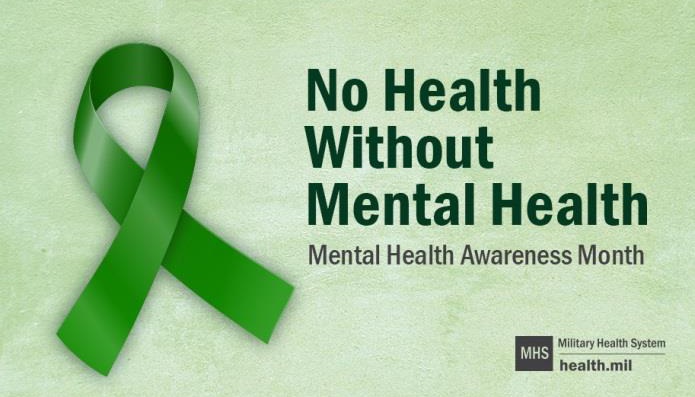Why the Stigma Around Mental Health Needs to End
May is Mental Health Awareness Month. As the month approaches, learn why ending the stigma is so important.
April 19, 2018
Suicide is a foreign word for almost every ten year old. However, I was ten when my uncle shot himself in his Los Angeles apartment on March 4th, 2010. Suddenly the word became common and my world changed.
My aunt was at work and had no idea she would soon come home to find her husband deceased. The two had been married for less than a year and they were both still madly in love with each other. They had the kind of love that is documented in movies. They spent almost every moment together. At their wedding, my uncle serenaded my aunt through song as she walked down the aisle. I remember the way my aunt and uncle would look at each other. It was so pure and full of tenderness. They had the love I still dream about to this day. My uncle’s suicide was a shock to anyone that knew him and even to those who knew him best.
When my mom tried to explain what had happened, I was confused and wondered why anyone would take their own life. Honestly, I was not sure what to think, but I remember wondering how my uncle was not the happy and carefree man that I made him out to be. I and most everyone never knew he was struggling and we definitely had no idea that it had gotten so bad. The thing about mental illness is that it is so complex because it is not seen by the common eye. This makes it extremely hard to pinpoint. I had no idea that my uncle’s suicide would change my outlook on life and mental disorders years later.
It has been eight years since the passing of my uncle, but mental illness is still just as taboo as the day of his funeral. It’s just one of those topics that are always swept under the rug; however, chances are that you know someone with a common mental health issue, such as anxiety or depression. Perhaps there are even people around you that you would never guess to be struggling. In fact, the Anxiety and Depression Association of America reports that major depressive disorder impacts more than 16 million adults living in America, while Mental Health America (MHA) reports that 43.7 million Americans deal with some type of mental illness each year. This makes it “the leading cause of disability in the U.S. for ages 15 to 44.3” (ADAA). Unfortunately, the statistics are drastic and they are real. So the question is: if mental disorders are such a common human issue, why are they not talked about more?
Considering the fact that mental health affects so many Americans, it is shocking that the U.S. government does not do more to help solve this issue. Although the federal government has regulations and laws regarding mental health in place, one problem persists: it is incredibly difficult for the common citizen to find a psychiatrist or therapist covered by their insurance company. John C. Goodman reports that “only 55% of psychiatrists accept any insurance as compared to 88.7% among physicians in other medical specialties” (“How Government Regulation Is Undermining Mental Health Care”). Not only is it a daunting task to reach out to get proper care for a mental illness, but most simply cannot afford that kinda care. Some may even think it is not worth it because it is not a physical health problem. They think that they can just ignore it because since it is not a psychical illness, what is the big deal? Perhaps it will go away on its own can be a common thought of those hesitant to getting help.
Another growing problem in America lies within the prison systems. Those living in jail with a mental health issue most likely will not get the help they deserve. The National Alliance on Mental Health says that “At least 83% of jail inmates with a mental illness did not have access to needed treatment” (“Jailing People With Mental Illness”). Most get worse in jail and consequently end up having to stay longer due to acting out because of mental issues. My uncle never acted out on behalf of his illnesses, but many do, which can get them in serious trouble. A study by the Treatment Advocacy Center reported that “American prisons and jails housed an estimated 356,268 inmates with severe mental illness in 2012.” It is surprising that there are not treatment plans set up for the ones jailed for mental issues and it creates an issue for law enforcement and for the inmates. In fact, an article by the Washington Post shares that once “in a Minnesota county jail, a man with schizophrenia stabbed out both of his eyes with a pencil in his cell. A study of 132 suicide attempts in a county jail in Washington found that 77 percent of them had a ‘chronic psychiatric problem,’ compared with 15 percent among the rest of the jail population” (“A shocking number of mentally ill Americans end up in prison instead of treatment”). Additionally, when released from prison, many no longer have health care and are unemployable. This can leave them homeless and without a way to get help, leading to a cycle of being arrested over and over because the problem was never fixed in the first place.
The stigma around mental health is dense. As time goes on, stigmatizing these issues becomes more dangerous and leads to stories like my uncle’s. 15 years ago, stigma was officially announced as a “public health concern,” according to the National Alliance on Mental Health. It is said to lead society to “avoid living, socializing or working with, renting to, or employing individuals with mental illness” (StigmaFree Me). Since many are unaware of how to bring up the topic, it is left in the dark, leaving many uneducated and this is damaging to those suffering from mental illness because this can leave them unemployed and without the professional care needed because they cannot afford it.
As a matter of fact, even though so many are affected by mental health problems, some actually believe that the stigma around mental health has ended. This could be due to social media taking a stand to create a community where it feels safe to open up about a mental condition. Regardless, stigma is not something of the past. Psychotherapist and writer for Psychology Today, Allison Abrams, shares her strong thoughts on the issue by saying “those having this mindset likely don’t live in a community where asking for help means potential ostracization, or come from a cultural background in which seeking psychological help is deemed as weakness, or have not had the unfortunate experience of being denied access to care due to subpar mental health benefits. In simple terms, to be of this mindset is to be privileged” (“The Catastrophic Effects of Mental Health Stigma”). Even though stigma became a publicized issue 15 years ago, it is just as relevant and real today.
Often people living with depression or other issues are told that all they need to do is to think happy thoughts and they will be “cured.” This way of thinking can be damaging to those affected and unfortunately, only adds to the stigma. Mental illness can also be seen as attention seeking, but “those living with a mental health condition don’t want it any more than a person would want a broken leg. But focused thought and effort can’t make depression go away, just as focusing on healing won’t fix a shattered bone” (StigmaFree Me). Of course, my uncle wanted to just be happy, but that was much harder for him because of the chemical imbalances and the hesitation to get professional help when needed because he should just “choose” to be happy.
Likewise, the biggest impact stigma has on those affected by mental disorders is the fact that it can feel like a shameful act to reach out and ask for help. Marina Olson, who works to educate and end the stigma around mental health, explains a common thought; “Society has always viewed mental illness as a sign of weakness. Despite how much we have discovered about how the brain works in the last 50 years, stigma still persists” (“The Catastrophic Effects of Mental Health Stigma”). I am sure that my uncle attempted to repress the pain he was going through because he grew up in a time when mental health was even more stigmatized and looked down on than it is today. With the viewpoint of mental illness being a weak point of human nature, most are too afraid to speak out. Of the 43.7 million Americans dealing with mental disorders, only one in five reaches out for professional health (MHA).
Men are the ones that find it the hardest to reach out. Rob Whitley, Ph.D. declared this a “silent crisis” with the fact that 75% of the people who kill themselves are of the male gender. Men are often much more hesitant to get psychiatric help than women. Whitley insists “This is often attributed to stubbornness in men, rooted in traditional American notions of masculinity that emphasize “true grit” doggedness” (“Men’s Mental Health: A Silent Crisis”). The motto that “boys don’t cry” is what is creating such a difficult and toxic environment for men looking to reach out for help. Men are seen as the ones to tough everything out and not show vulnerability. Whitley continues by saying, “another explanation is that formal mental health services are not finely attuned to men’s needs, especially minority men. Indeed, these services tend to emphasize medication or talk-therapy. But some research suggests that men prefer action over words in the face of stressful situations.” It is difficult to find the right kind of help as a man, especially with society’s pressure to just “man-up.” Society never wants to see a man being fragile which makes it incredibly hard to show any sign of struggle. Perhaps these are some factors that lead to my uncle’s suicide. He was probably too afraid that he would seem weak to his family or wife if he reached out to get the help he needed.
Sadly, the stigma surrounding mental illnesses, and illnesses in general, will not go away immediately. My uncle’s passing actually made mental health more of a taboo topic in my family. Simply no one talks about it and even though positive steps have been taken towards creating a society that is more accepting, there is a lot of room for improvement. National Alliance on Mental Illness organization StigmaFree Me provides useful information about why ending the stigma is extremely important in today’s culture. Additionally, the website includes steps towards creating a society that does not stigmatize mental health, yet rather fosters a mindset which encourages reaching out for help. Some of the steps that can be taken to create a more stigma-free world include being careful with word usage, separating the disorder from the person, and being open to those speaking out about their issues. It’s not a quick process, but one-day mental illness will be treated like any physical illness. This will evidently stop the tragedies that come from stigmatizing mental disorders and form a society that is unafraid to ask for help. Together we can bring the same clear-headedness that is shown for physical health to the society’s mindset on mental health.






































